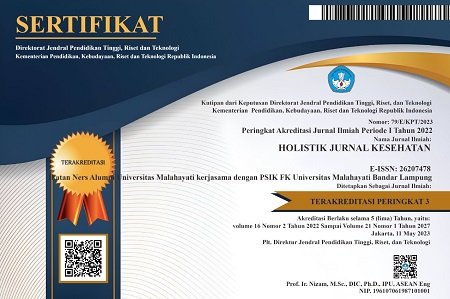Hubungan pengetahuan tentang Covid-19 dengan perilaku protokol kesehatan di perkantoran
Abstract
Background: A possible office Covid cluster could result from office activity during a pandemic. Implementing health protocols is essential to help protect oneself from the transmission of Covid-19 knowledge of Covid-19 decisions to behave according to health protocols.
Purpose: To analyze the relationship between knowledge about Covid-19 and the behavior of implementing health protocols in the office environment.
Method: Analytical observation was carried out by collecting data cross-sectional. The population consisted of school teachers, samples were taken based on voluntary sampling with online questionnaires, and 114 respondents participated. Questionnaires were made by the research team and tested for validity and reliability. The results of the data were processed statistically with the Spearman correlation test.
Results: There is a relationship between knowledge and behavior of health protocols in the office environment: hand washing steps (r=0.255, p=0.006), minimum distance for interaction (r=0.231, p=0.013), and the type of mask used to go to the office (r=0.312, p=0.001).
Conclusion: There is a significant relationship between knowledge of Covid-19 and behavior of health protocols in the office environment, so increased knowledge about Covid-19 needs to be continuously pursued to improve health protocol behavior.
Keywords: Covid-19; Behavior; Knowledge; Regulation
Pendahuluan: Kegiatan perkantoran di masa pandemic dapat berpotensi menjadi klaster perkantoran. Perilaku menerapkan protokol kesehatan menjadi hal penting dilakukan untuk membantu memproteksi diri dari penularan COVID-19. Pengetahuan akan Covid-19 menginformasikan keputusan untuk berperilaku sesuai protokol kesehatan.
Tujuan: Menganalisis hubungan antara pengetahuan tentang Covid-19 dengan perilaku menerapkan protokol kesehatan di lingkungan kantor.
Metode: Dilakukan analitik observational dengan pengambilan data secara cross sectional. Populasi berupa guru-guru sekolah, sampel diambil berdasarkan voluntary sampling dengan kuesioner online, sejumlah 114 responden berpartisipasi. Kuesioner dibuat oleh tim peneliti, dilakukan uji validitas dan reliabilitas. Hasil data diolah statistik dengan uji korelasi Spearman.
Hasil: Terdapat hubungan antara pengetahuan dan perilaku protokol kesehatan di lingkungan perkantoran, yaitu langkah cuci tangan (r=0.255, p=0.006), jarak minimal berinteraksi (r=0.231, p=0.013), dan jenis masker yang digunakan ke kantor (r=0.312, p=0.001).
Simpulan: Terdapat hubungan yang signifikan antara pengetahuan akan Covid-19 dengan perilaku protokol kesehatan di lingkungan perkantoran sehingga peningkatan pengetahuan tentang Covid-19 perlu terus diupayakan agar perilaku protokol kesehatan semakin baik.
Keywords
References
Albarracín, D., Fishbein, M., Johnson, B. T., & Muellerleile, P. A. (2001). Theories of reasoned action and planned behavior as models of condom use: A meta-analysis. Psychological Bulletin, 127(1), 142–161. https://doi.org/10.1037/0033-2909.127.1.142
Bruin, W., & Bennett, D. (2020). Relationship Between Initial COVID-19 Risk Perceptions and Protective Health Behaviour: A National Survey. American Journal of Preventive Medicine, 59(2), 157–167.
Doremalen, N. van, Bushmaker, T., Morris, D. H., Holbrook, M. G., Gamble, A., Williamson, B. N., Tamin, A., Harcourt, J. L., Thornburg, N. J., Gerber, S. I., Lloyd-Smith, J. O., Wit, E. de, & Munster, V. J. (2020). Aerosol and surface stability of HCoV-19 (SARS-CoV-2) compared to SARS-CoV-1. MedRxiv, 2020.03.09.20033217. https://doi.org/10.1101/2020.03.09.20033217
Ernawaty, E., Rochmah, T. N., Afro, R. C., Dewi, M. S., & Wulandari, A. (2022). Applying Milgram’s Theory and Health Belief Model in Understanding Compliance to Health Protocols of Covid-19 Pandemic. Jurnal Aisyah : Jurnal Ilmu Kesehatan, 7(1), 223–230. https://doi.org/10.30604/jika.v7i1.897
Glanz, K., Rimer, B. K., & Viswanath, K. (Eds.). (2015). Health Behavior Theory, Research and Practice (5th ed.). Jossey-Bass.
Glass, R. J., Glass, L. M., Beyeler, W. E., & Min, H. J. (2006). Targeted social distancing design for pandemic influenza. Emerging Infectious Diseases, 12(11), 1671–1681. https://doi.org/10.3201/eid1211.060255
International Labour Organization. (2020). Keselamatan dan Kesehatan tempat kerja di masa pandemi.
Kast, F. E., & Rosenzweig, J. E. (2003). Organisasi dan Manajemen. PT Bumi Aksara.
Kementerian Kesehatan Republik Indonesia. (2020). Pedoman Pencegahan dan Pengendalian Coronavirus Disease (COVID-19).
Kementerian Pendidikan dan Kebudayaan Republik, & Indonesia. (2020). Keputusan bersama Menteri Pendidikan dan Kebudayaan, Menteri Agama, Menteri Kesehatan, dan Menteri Dalam Negeri Republik Indonesia tentang Panduan Penyelenggaraan Pembelajaran pada Tahun Ajaran 2020/2021 dan tahun akademik 2020/2021 di masa pandemi corona.
Li, D. Q., Guan, X., Wu, P., Wang, X., Cowling, D. B., Yang, B., Leung, M., & Feng, Z. (2020). Early Transmission Dynamics in Wuhan, China, of Novel Coronavirus-Infected Pneumonia. Public Health, 13, 1199–1207. https://doi.org/10.1056/NEJMoa2001316
Notoatmodjo, S. (2012). Promosi Kesehatan dan Perilaku Kesehatan. PT Rineka Cipta.
Santana-López, B. N., Santana-Padilla, Y. G., Santana-Cabrera, E. G., Ruiz-Rodríguez, G. R., González-Martín, J. M., & Santana-Cabrera, L. (2021). Teachers’ attitudes and knowledge about the COVID-19 pandemic in the Canary Islands. Revista Peruana de Medicina Experimental y Salud Publica, 38(1), 64–69. https://doi.org/10.17843/RPMESP.2021.381.6312
Satuan Tugas Penanganan COVID-19. (2020). Munculnya klaster perkantoran baru COVID-19.
Wu, F., Zhao, S., Yu, B., Chen, Y., Wang, W., Hu, Y., Song, Z., Tao, Z., Tian, J., Pei, Y., Yuan, M., Zhang, Y., Dai, F., Liu, Y., Wang, Q., Zheng, J., Xu, L., & Holmes, E. (2020). Complete genome characterisation of a novel coronavirus associated with severe human respiratory disease in Wuhan, China. https://doi.org/10.1101/2020.01.24.919183
Xiao, F., Tang, M., Zheng, X., Liu, Y., Li, X., & Shan, H. (2020). Evidence for Gastrointestinal Infection of SARS-CoV-2. Gastroenterology, 158(6), 1831-1833.e3. https://doi.org/10.1053/J.GASTRO.2020.02.055
Yanti, B., Wahyudi, E., Wahiduddin, W., Novika, R. G. H., Arina, Y. M. D., Martani, N. S., & Nawan, N. (2020). Community Knowledge, Attitudes, and Behavior Towards Social Distancing Policy As Prevention Transmission of Covid-19 in Indonesia. Jurnal Administrasi Kesehatan Indonesia, 8(2), 4. https://doi.org/10.20473/jaki.v8i2.2020.4-14
Zhu, N., Zhang, D., Wang, W., Li, X., Yang, B., Song, J., Zhao, X., Huang, B., Shi, W., Lu, R., Niu, P., Zhan, F., Ma, X., Wang, D., Xu, W., Wu, G., Gao, G. F., & Tan, W. (2020). A Novel Coronavirus from Patients with Pneumonia in China, 2019. New England Journal of Medicine, 382(8), 727–733. https://doi.org/10.1056/nejmoa2001017
Zou, X., Chen, K., Zou, J., Han, P., Hao, J., & Han, Z. (2020). Single-cell RNA-seq data analysis on the receptor ACE2 expression reveals the potential risk of different human organs vulnerable to 2019-nCoV infection. Frontiers of Medicine, 14(2), 185–192. https://doi.org/10.1007/S11684-020-0754-0
DOI: https://doi.org/10.33024/hjk.v16i7.8757
Refbacks
- There are currently no refbacks.
Copyright (c) 2022 Holistik Jurnal Kesehatan

This work is licensed under a Creative Commons Attribution-NonCommercial 4.0 International License.














